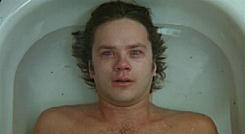From book to film — it’s an author’s dream. But more great pieces end up in purgatory than they ever do on celluloid. It’s common for a popular book, script or story idea to be scooped  up by Hollywood bloodhounds, only to languish in development, suffer repeated rewrites and pass through multiple hands before being indefinitely shelved.
up by Hollywood bloodhounds, only to languish in development, suffer repeated rewrites and pass through multiple hands before being indefinitely shelved.
After seeing the film Jacob’s Ladder way back when, I discovered it had almost suffered a similar fate. Bruce Joel Rubin began writing Jacob’s Ladder in the fall of 1980 and finished a year later. His script bounced around Hollywood from one director to another. In 1984, it was listed in American Film as one of the ten best unproduced screenplays in Hollywood. Eventually, when Lindsay Doran became a vice president at Paramount Pictures, the studio purchased it and, nearly a decade after the script’s completion, the film was made.
This idea that there are oodles of great unproduced screenplays floating around Hollywood — so many that they’d even attempt to rate the ten best — is fascinating. How many inspirational, dramatic, even important stories are collecting dust on some shelf, waiting for the planets to align? Or an A-list director to take interest.
The L.A. Times, in a new weekly feature entitled Scriptland, reports on one such script. The article was entitled The Big Name Gets Distracted.
J. Michael Straczynski’s “Changeling” is one of those blessed and doomed
screenplays that periodically floats around Hollywood: a truly gripping read that actors and directors respond to with passion but that nonetheless has a hard time getting made. For a screenwriter, this can be an excruciating reality that only gets more painful when an A-list director is among those flirting with it.
So it has gone with Oscar-winning director Ron Howard (“A Beautiful Mind”), who has long been interested in making “Changeling” but who recently committed to direct the feature version of Peter Morgan’s political play “Frost/Nixon”…Â
At one point Howard was smitten enough with “Changeling” to meet with Straczynski, a longtime TV writer (“Babylon 5,” “Murder, She Wrote”) eager to have his first produced feature. Says Straczynski: “There are all kinds of circumstances that can affect whether or not something goes forward….”
“Changeling” is set in 1928 Los Angeles and based on the real-life account of a single mother whose 9-year-old son disappears. When the boy turns up four months later, she becomes convinced that the police have returned the wrong child, despite the persuasion of everyone around her.
No doubt, having Ron Howard interested in your project is a good sign. But as Straczynski notes, “There are all kinds of circumstances that can affect whether or not something goes forward…” Â
In the case of “Changeling,” the biggest “circumstance” appears to be — you guessed it — mulah.
…the narrative is built around a lead character who slowly, intensely teeters toward a form of madness. It’s the kind of rare, weighty female role that has attracted Oscar winner Reese Witherspoon and likely every other A-list actress
in Hollywood. But “Changeling” is not exactly “How the Grinch Stole Christmas”; it’s a brooding downer, in the mold of Howard’s “The Missing,” which made only $27 million in theaters.
(Straczynski’s probably not the only one disappointed. After watching Howard go off and make three quarters of a billion dollars with Oscar winner Akiva Goldsman’s adaptation of Dan Brown’s mega-seller “The Da Vinci Code,” Universal Pictures, to whom Howard owes his next film, had been hoping to steer the director toward similarly commercial fare.)
Ahh, the dreaded “commercial fare.” Why produce “a brooding downer” when you can, fairly easily, “go off and make three quarters of a billion dollars” on something less risky. So what more commercial project has Universal “steered” Howard toward? How about “Angels & Demons,” Dan Brown’s precursor to “The Da Vinci Code,” which will, once again, be adapted by Goldsman. The book brings a built-in fan base and is, almost guaranteed, to give Universal what they want.
Alas, is there any way for an author to avoid consigning their piece to purgatory? Good writing is no guarantee. There’s plenty of well-written books and scripts that will make the “Ten Best Unpublished” list. Perhaps the surest means to publication/production heaven is to avoid writing “brooding downers” and proceed straight to the “commercial fare.” For some artists, however, that concession is pure hell.
Â














There was an interesting piece on NPR today, though, that suggested the opposite. Kenneth Turan was talking about how the studios are reluctant to spend $100 million on a ‘blockbuster’ that may turn out to be a bust. So they’re turning to smaller films that cost less to make and aren’t as big a risk. It’s likely that “Angels & Demons” will earn its cost several times over, but there are fewer films like that. Which is fine with me. My problem is that the smaller, independent or quasi-independent movies almost never get to small-town Kansas. We have to wait till they come out on DVD.
Still, your point is valid — in a risk-averse culture like major studios the challenging script is less likely to get picked up.
Thanks for the comments, Linda. I don’t think that studios are strictly looking for blockbuster material, but for stories that are palatable, sellable, and ultimately, profitable. How else could The Texas Chainsaw Massacre: The Beginning, be made? Like it or not, movies like Saw III and Jackass II are made cheap and usually make money. Movies of substance are probably risky because they ask the viewer to think, and with the average American’s attention span crippled by excessive TV viewing and personal sloth, that’s asking alot. I’m with you about independant films, however.